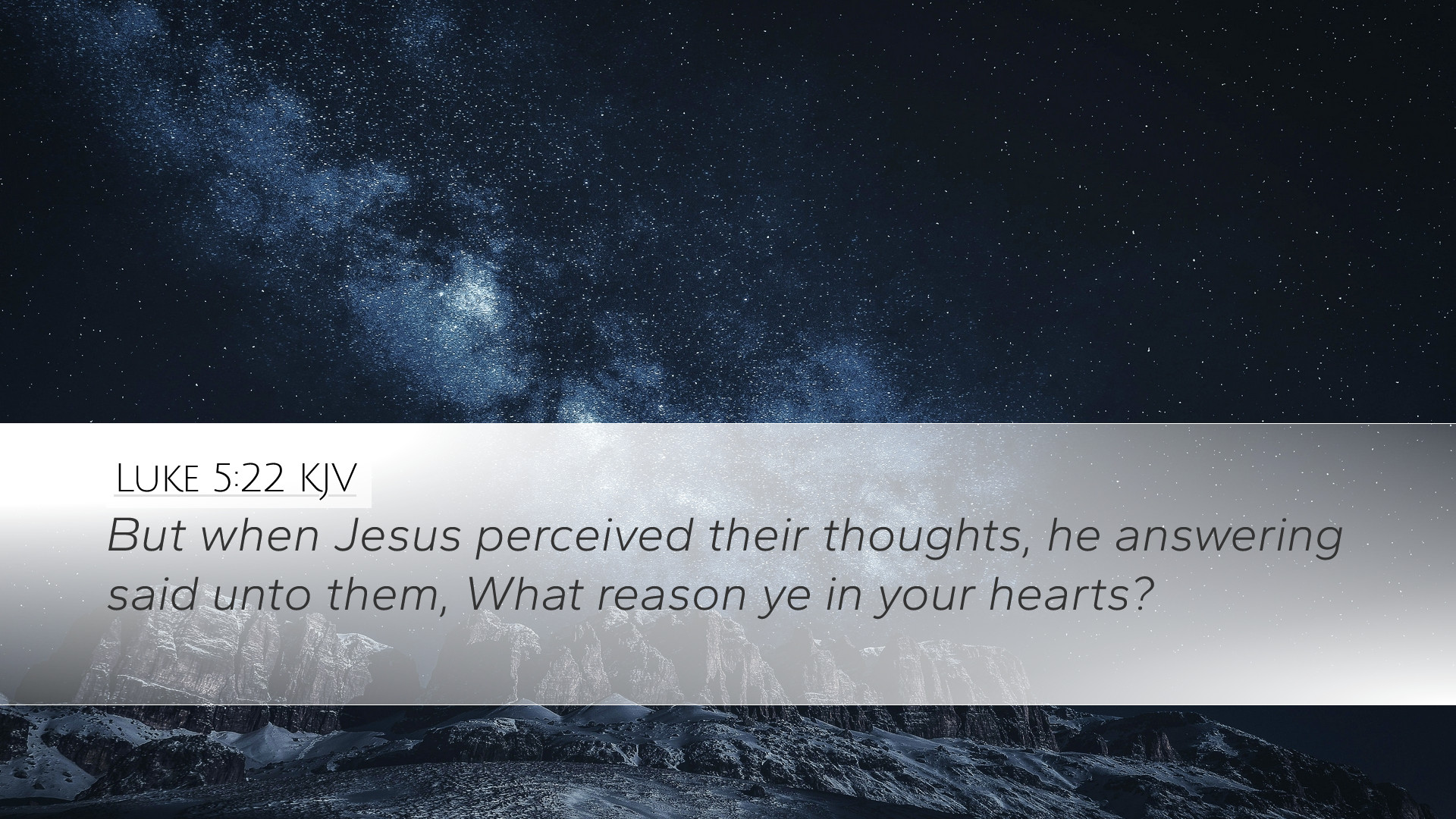Commentary on Luke 5:22
Verse Context: Luke 5:22 states, "But when Jesus perceived their thoughts, he answering said unto them, What reason ye in your hearts?" This verse occurs in the passage where Jesus is teaching in a crowded house, and it follows the miraculous healing of the paralytic man. The verse highlights the intersection of faith, understanding, and divine knowledge.
Insights from Commentaries
Matthew Henry's Commentary
Matthew Henry emphasizes the significance of Jesus's ability to perceive the thoughts of the Pharisees and the teachers of the law. He notes that this divine insight serves as a testament to the omniscience of Christ, confirming His divine authority. This moment is critical as it not only reveals the skepticism of the religious leaders but also Jesus's ability to discern hearts, which is a theme throughout the Gospel narratives.
- Divine Knowledge: Henry points out that Jesus knew their thoughts, not just their words. This emphasizes His divine nature as the Son of God, who understands the true state of humanity's heart.
- Encouragement of Faith: The miracle that follows calls for faith. Henry indicates that Jesus challenges the reasoning of their hearts, inviting them to reconsider their perspective on faith, forgiveness, and the power of God.
Albert Barnes' Notes on the Bible
Barnes elaborates on the phrase "What reason ye in your hearts?" He interprets this as Jesus not merely questioning their thoughts but rebuking their skepticism. He makes two principal observations:
- Challenge to Authority: Barnes highlights that the question confronts the religious leaders' reasoning, who felt that Jesus overstepped His bounds in forgiving sins. In essence, this moment calls into question the established authority of the religious elite.
- Reflection of the Heart: Barnes adds that the heart's reasoning reflects internal beliefs and attitudes. By posing this question, Jesus invites introspection among the listeners about their own spiritual condition.
Adam Clarke’s Commentary
Clarke provides an analytical view on the thoughts of the Pharisees. He suggests that their thoughts were marked by a mix of jealousy and disbelief regarding Jesus's actions and His claims of divinity. Clarke suggests that:
- Understanding Human Nature: Clarke emphasizes that the ability of Jesus to discern thoughts points to His understanding of human nature and the innate tendencies toward doubt and misunderstanding.
- Divine Authority to Forgive: Furthermore, Clarke notes that Jesus’s query reveals the tension between divine authority and human expectation. This moment serves as a catalyst for further teachings about faith and the nature of God’s mercy.
Theological Implications
The theological implications of Luke 5:22 are profound. This verse not only illustrates God's omniscience but also presents a reflective call to all who read or hear it regarding their own hearts and thoughts.
- Awareness of Inner Thoughts: Believers are reminded that God knows the innermost thoughts, urging an honest confrontation with one's own internal struggles and doubts.
- Invitation to Faith: The challenge presented by Jesus serves as an invitation for deeper faith, urging individuals to move from skepticism to belief. The healing of the paralytic becomes a physical manifestation of the spiritual realities Jesus presents.
- Critical Reflection for Leaders: Pastors and church leaders are particularly challenged by this passage to examine their own hearts and motives, ensuring that they are in alignment with God's purposes.
Conclusion
Luke 5:22 functions as a vital intersection of faith, authority, and inner reflection. Through insights gathered from the commentaries of respected theologians like Matthew Henry, Albert Barnes, and Adam Clarke, we find a multi-faceted approach to understanding this pivotal moment in Jesus’s ministry. It serves not only as a reminder of Christ's divine authority and omniscience but also as an introspective call that invites each individual to reconcile their inner thoughts and external expressions of faith.


